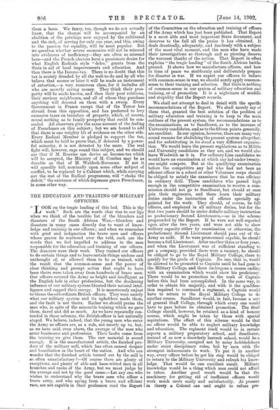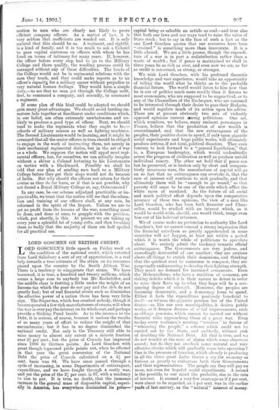THE EDUCATION AND TRAINING OF MILITARY OFFICERS.
" LOOK on the tragic loading of this bed. This is thy work." Such are the words that rise to our lips when we think of the terrible list of the blunders and disasters of the South African War,—blunders and disasters in many cases directly due to want of know- ledge and training in our officers ; and when we remember with grief and indignation the brave men and officers whose graves lie scattered over the veld, such are the words that we feel impelled to address to the men responsible for the education and training of our officers. The disasters were their work. They trained our officers to do certain things and to leave certain things undone and unthought of, or allowed them to be so trained, with the result that the common-sense and the power of clear thinking and prompt action that ought to have been theirs were taken away from hundreds of brave men. Our officers entered the Army as bright and intelligent as the English lads in other professions, but the deadening influence of our military system blunted their natural intel- ligence and sapped their energy. It is monstrously unjust to blame the subordinate British officers. They were merely what our military system and its upholders made them, and the fault is not theirs. Rather we should praise the men who, in spite of the miserable training which we gave them, dared and did so much. As we have repeatedly con- tended in these columns, the British officer is not naturally stupid. We believe, indeed, that the young men who enter the Army as officers are, as a rule, not merely up to, but, as we have said, even above, the average of the men who enter businesses and professions. Their faults come from the training we give them. The raw material is sound enough. It is the manufactured article, the finished pro- duct of the military mill, which has often caused despair and humiliation in the heart of the nation. And who can wonder that the finished article turned out by the mill is so often unsatisfactory P—Of course there are plenty of exceptions, and plenty of able and keen-witted men in all branches and ranks of the Army, but we must judge by the average and not by the good cases.—Let any one who wishes to understand why the brave men who officer a brave army, and who spring from a brave and efficient race, are not capable in their profession read the Report of the Committee on the education and training of officers of the Army which has just been published. That Report is a most able and most important State document, and deserves to the full all the praise it has obtained. It deals drastically, adequately, and fearlessly with a subject of the most vital moment, and the men who have made their investigations so thorough and so piercing deserve the warmest thanks of the nation. That Report in effect explains "the tragic loading" of the South African battle- ground. It shows how we manufacture officers, and how in time of peace we stubbornly and deliberately prepare for disaster in war. If we expect our officers to behave with common-sense in war, we should surely apply common. sense to their training and selection. But there is nothing of common-sense in our system of military education and training, or of promotion. It is a nightmare of muddle and stupidity that the Report records.
We shall not attempt to deal in detail with the specific recommendations of the Report. We shall merely say of them that, granted the best solution of the problem of military education and training is to keep to the main outlines of the present system, the recommendations as to the examinations, as to Sandhurst, as to the increase of University candidates, and as to the fifteen points generally, are excellent. In our opinion, however, there are many very sound reasons for abolishing the present system altogether, and for substituting in its stead a very different organisa- tion. We would leave the present regulations as to Militia and University candidates as they are, and we would also leave Woolwich as it is. For ordinaryLine candidates we would have an examination at which any lad under twenty- one might compete. But at the qualifying examination before the competitive any lad who had not been an efficient officer in a school or other Volunteer corps should be obliged to satisfy the examiners that he was efficient in ordinary drill. Those candidates who passed high enough in the competitive examination to receive a com- mission should not go to Sandhurst, but should at once join their regiments, and there learn their military duties under the instruction of officers specially ap- pointed for the work. They should, of course, be full officers, and employed in all military duties, but for the first two years should be under definite military instruction as probationary Second Lieutenants,—as in the scheme propounded by the Report. If he were not well reported upon after the two years, and were not able to show military capacity either by examination or otherwise, the probationary Second Lieutenant should pass out of the Army as unfit. If he were pronounced capable, he should become a full Lieutenant. After another three or four years, and when the Lieutenant was of sufficient standing to get a company, provided there were a vacancy, he should be obliged to go to the Royal Military College, there to qualify for the grade of Captain. No one, that is, would be allowed to be promoted to Captain until he had gone to the Military College, and there undergone a course ending with an examination which would show his proficiency. There would be no promotion to the rank of Captain before this had been accomplished. In the same way, in order to obtain his majority, and with it the qualifies,- tion required to command a regiment, a Captain would have to return to the Royal Military College to do =other course. Sandhurst would, in fact, become a sort of general Staff College, through which every one would have to pass before he obtained promotion. The Staff College should, however, be retained as a kind of honour course, which might be taken by those with special aspirations. The effect of this scheme would be that no officer would be able to neglect military knowledge and education. The regiment itself would be in certain aspects a military preparatory school, and Sandhurst, instead of as now a disorderly barrack school, would be a, Military University, occupied not by noisy hobbledehoys under strict disciplinary rules, but by men with the strongest inducements to work. To put it in another way, every officer before he got his step would be obliged to return to the Military University and refresh his know- ledge. That would be one excellent result. Military knowledge would be a thing which men could not afford to taboo. Another good result would be that the machinery for getting rid of inefficient officers would work much more easily and satisfactorily. At present in theory a Colonel can and ought to refuse pro- motion to men who are clearly not likely to prove efficient company officers. As a matter of fact, it is very seldom that mefficients are weeded out. It is only natural that this should be so. A regiment, and rightly, is a kind of family, and it is too much to ask a Colonel to pass capital sentences on officers with whom he has lived on terms of intimacy for many years. If, however, the officer before every step had to go to the Military College and there qualify, the weeding process could be managed without any of these difficulties. The heads of the College would not be in regimental relations with the men they teach, and they could make reports as to an officer's capacity for a military career without prejudice to very natural human feelings. They would have a simple duty,—to see that no man got through the College unfit, first, to command a company, and secondly, to command a regiment.
If some plan of this kind could be adopted we should gain many great advantages. We should avoid herding im- mature lads together at Sandhurst under conditions which, in our belief, are often extremely unwholesome and un- likely to produce a good type of officer. Next, we should tend• to make the regiments what they ought to be,— schools of military science as well as fighting machines. The Second Lieutenants would be learning, and it might be arranged that all the senior officers in turn should be obliged to engage in the work of instructing them, not merely in their mechanical regimental duties, but in the art of war as a whole. We suppose the notion will appal most regi- mental officers, but, for ourselves, we can actually imagine without a shiver a Colonel lecturing to his Lieutenants on tactics with a blackboard. Possibly we shall be told that our plan of sending men back to a Military College before they got their steps would not do because of India. But why should the officers not return for their course as they do for leave, or if that is not possible, why not found a Royal Military College at, say, Ootacamund ?
In any case, be our scheme adjudged practicable or im- practicable, we trust that the nation will see that the educa- tion and training of our officers shall, at any rate, be reformed in the spirit of the Report. Unless we are to get no profit from the lessons of the war, something must be done, and done at once, to grapple with the problem, which, put shortly, is this. At present we are taking up every year a splendid lot of young colts, and then breaking them so badly that the majority of them are half spoiled for all practical use.











































 Previous page
Previous page